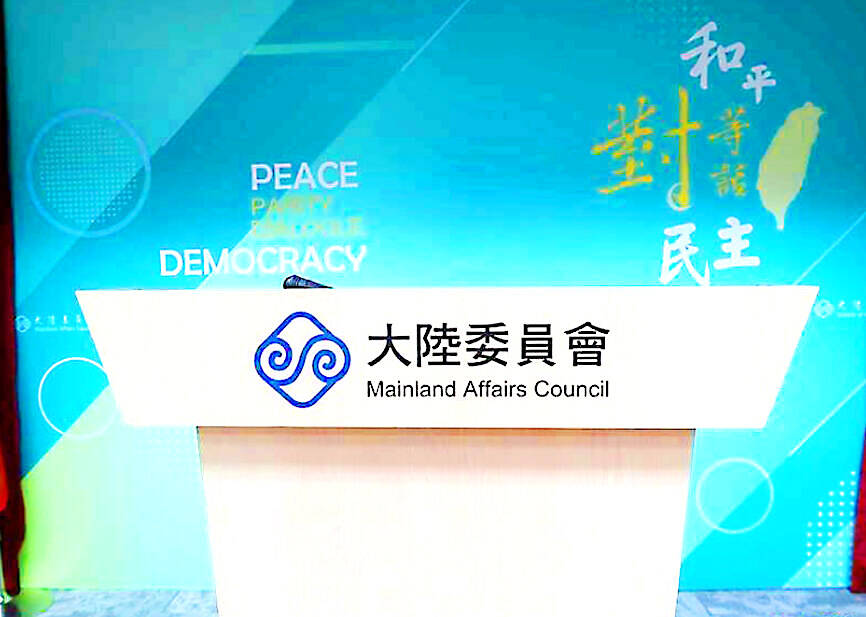The Chinese Communist Party’s (CCP) interference in Taiwan’s elections is an attempt aimed at compelling the new president-elect to negotiate on trade-related issues and moving toward its goal of economic integration, a recent report by the Mainland Affairs Council (MAC) said.
The report said that as the presidential election draws closer, the CCP has intentionally used the issues, including trade barrier investigation, bans on agricultural export and Chinese tourists to intensify its interference in Taiwan’s election.
The CPP also continued to meet with some Taiwanese figures to make the impression that cross-strait relations are facing a choice of future prospect — between “peace and war” and between “prosperity and recession” — with the aim of influencing voting intentions, it said.

Photo: Chung Li-hua, Taipei Times
The report attributed China’s interference to mainly three reasons: “Beijing’s heightened sense of crisis toward Taiwan’s situation,” that “the normalization of the US-Taiwan relationship has struck China’s raw nerve,” and that “China’s worsening domestic issues prompts it to intensify pressure on Taiwan.”
The Taiwanese government’s refusing Chinese President Xi Jinping’s (習近平) “one country, two systems” formula is seen by Beijing as challenging Xi’s Taiwan policy and damaging his prestige, it said.
China’s sluggish demand, sagging economy and high unemployment rate have contributed to internal pressure on Beijing to be more proactive on Taiwan.
Beijing is attempting to change the cross-strait relation structure from inside Taiwan by manipulating voters to elect a more China-friendly president, the report said.
Beijing aims to change the cross-strait dynamics from being among “equals” to a “master-slave relationship,” it said.
China is using its trade barrier investigation and other elements of psychological warfare to threaten Taiwanese, the report said.
Another aim of such psychological warfare is to put pressure on the president-elect to restart the cross-strait service trade agreement and economic cooperation framework agreement talks with China to accomplish “cross-strait economic integration,” it said.
The scholars commissioned by the MAC to produce the report said that although increasingly more Taiwanese businesspeople doing business in China are returning to Taiwan, the government should take necessary actions to assist them and prevent their losses.
In the mid to long term, the government should assist those that would be badly affected by an industrial transformation by increasing their resilience, and in the short term it should at least provide similar-scaled subsidies to make up for the effect of China’s coercive actions, they said.

Eight restaurants in Taiwan yesterday secured a one-star rating from the Michelin Guide Taiwan for the first time, while three one-star restaurants from last year’s edition were promoted to two stars. Forty-three restaurants were awarded one star this year, including 34 in Taipei, five in Taichung and four in Kaohsiung. Hosu (好嶼), Chuan Ya (川雅), Sushi Kajin (鮨嘉仁), aMaze (心宴), La Vie by Thomas Buhner, Yuan Yi (元一) and Frassi in Taipei and Front House (方蒔) in Kaohsiung received a one-star rating for the first time. Hosu is known for innovative Taiwanese dishes, while Chuan Ya serves Sichuan cuisine and aMaze specializes

STATS: Taiwan’s average life expectancy of 80.77 years was lower than that of Japan, Singapore and South Korea, but higher than in China, Malaysia and Indonesia Taiwan’s average life expectancy last year increased to 80.77 years, but was still not back to its pre-COVID-19 pandemic peak of 81.32 years in 2020, the Ministry of the Interior said yesterday. The average life expectancy last year increased the 0.54 years from 2023, the ministry said in a statement. For men and women, the average life expectancy last year was 77.42 years and 84.30 years respectively, up 0.48 years and 0.56 years from the previous year. Taiwan’s average life expectancy peaked at 81.32 years in 2020, as the nation was relatively unaffected by the pandemic that year. The metric

Taitung County is to launch charter flights to Malaysia at the end of this year, after setting up flights to Vietnam and Thailand, the Taitung County Government said yesterday. The new charter flight services, provided by low-cost carrier Batik Air Malaysia, would be part of five-day tour packages for visits to Taitung County or Malaysia. The Batik Air charter flight, with about 200 seats, would take Malaysian tourists to Taitung on Dec. 30 and then at 12:35pm return to Kuala Lumpur with Taiwanese tourists. Another charter flight would bring the Taiwanese home on Jan. 3 next year, arriving at 5:30pm, before taking the

Taiwan High Speed Rail Corp. (THSRC) plans to ease strained capacity during peak hours by introducing new fare rules restricting passengers traveling without reserved seats in 2026, company Chairman Shih Che (史哲) said Wednesday. THSRC needs to tackle its capacity issue because there have been several occasions where passengers holding tickets with reserved seats did not make it onto their train in stations packed with individuals traveling without a reserved seat, Shih told reporters in a joint interview in Taipei. Non-reserved seats allow travelers maximum flexibility, but it has led to issues relating to quality of service and safety concerns, especially during